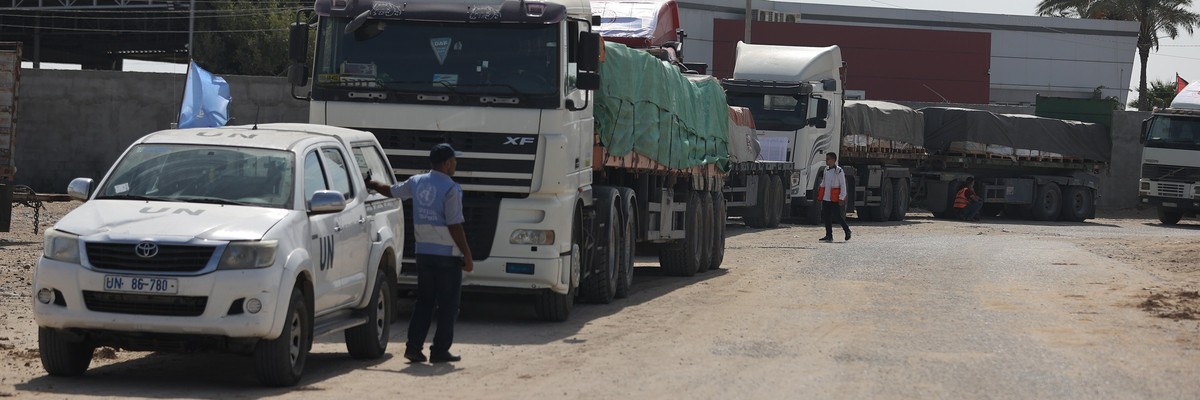United Nations officials accused Israeli troops of firing on a convoy delivering aid to Palestinians in the Gaza Strip on Thursday, nearly 12 weeks into Israel's devastating war on the besieged enclave.
"Israeli soldiers fired at an aid convoy as it returned from northern Gaza along a route designated by the Israeli army," said Thomas White, the United Nations Relief and Works Agency for Palestine Refugees in the Near East (UNRWA) director in Gaza.
"Our international convoy leader and his team were not injured but one vehicle sustained damage—aid workers should never be a target," White added in his social media post.
According toThe New York Times:
The convoy, whose vehicles were marked with U.N. insignia, was returning from delivering aid, including flour. It was south of Gaza City when it came under fire, Juliette Touma, spokeswoman for UNRWA, said in an interview. Before setting out to deliver the aid, the convoy had coordinated its plans with the Israeli military and notified it of the routes it would take, she added.
Ms. Touma said that the Israeli military had told the convoy to take a different route, which it did. "They rerouted and then the shooting happened," she said.
The newspaper noted similar incidents in Gaza City since the war began with a Hamas-led attack on Israel October 7: an International Committee of the Red Cross medical convoy came under fire November 7 and a Doctors Without Borders convoy trying to evacuate people sheltering in a hospital endured what it called a deliberate assault by Israeli forces November 18.
UNRWA Commissioner-General Philippe Lazzarini declared Friday that such attacks "hinder lifesaving operation in Gaza."
Martin Griffiths, the U.N. under-secretary-general for humanitarian affairs and emergency relief coordinator, said Friday that "I strongly condemn an incident yesterday in which an aid convoy was fired upon while traveling from northern Gaza to Rafah."
"The convoy was clearly marked and its movements were coordinated with the parties," Griffiths stressed. "Attacks on humanitarian workers are unlawful. The conflict must stop."
The Times of Israelreported Friday that the Israel Defense Forces "says it is looking into the reports" of the Thursday attack.
Like the vast majority of Gaza residents, "most UNRWA staff members have been forced to flee their homes," The New York Times noted, and the aid situation "has remained dire despite the passage last week of a U.N. Security Council resolution" that stopped short of demanding a cease-fire but called for "urgent and extended humanitarian pauses and corridors throughout the Gaza Strip for a sufficient number of days to enable full, rapid, safe, and unhindered humanitarian access."
In a lengthy Friday statement noting that resolution, the UNRWA detailed the difficulties distributing aid throughout the war, which has killed over 21,500 people in Gaza.
Lazzarini said that "over the past days, several statements from Israeli officials have insinuated or directly held UNRWA responsible for gaps in aid deliveries in the Gaza Strip. These statements were amplified by Israeli and other mainstream and social media, creating a stream of baseless misinformation."
"For the first two weeks of the war, the Israeli authorities imposed a hermetic siege on the Gaza Strip, banning the entry of all supplies including food, water, medicine, and fuel," he continued, highlighting that even in the wake of the U.N. resolution, "the delivery of much-needed and urgent aid continues to be limited in quantities and riddled with logistical hurdles."
"I call on the Israeli authorities, other parties to the conflict, and those with influence over them to safeguard an environment for safe and unimpeded delivery of humanitarian aid," the UNRWA leader said, issuing a list of specific demands. "Food, water, fuel, and all humanitarian assistance must never be used as a weapon of war. Aid must never be diverted or politicized."

